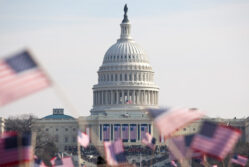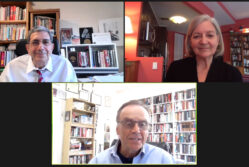Event Coverage Highlight

Anne Garrels Observes Vast Changes in ‘Putin Country’
When Anne Garrels returned to the Soviet Union in 1992 to work as correspondent for NPR, she looked for a way to cover long-term changes in one particular community after the fall of the Soviet Union. She chose Chelyabinsk, an industrial “middle Russia” city about 1,000 miles east of Moscow.
On June 7, 2016, the OPC hosted a book night to discuss Putin Country: A Journey into the Real Russia, the result of more than 20 years of reporting in Russia and frequent visits to Chelyabinsk.
Garrels said during protests after legislative elections in 2011, Western media focused too much on what was happening in Moscow, to the exclusion of the rest of the country.
“It was distorting. If you were reading The New York Times, you would think the country was up in arms. But out in the provinces, that was not the case,” she said.
She said reports had missed out on alternative perspectives from people living outside the capital.
“By the benefit of high oil prices and gas prices in 2000 when he came in, Putin gave people a sense of economic prosperity for the first time,” she said.
Garrels said as Russia opened to the West in the early 90s, people in Chelyabinsk were excited and optimistic. But slowly, they started to learn about the rest of the world and grew suspicious as NATO closed in on Russia’s borders. People felt like “betrayed lovers,” she said, as disillusionment set in and the West treated Russians like losers. “It was a toxic combination.”
She said Putin capitalized on those sentiments to build support for his nationalist policies, blaming the flagging economy on the West and pledging to become stronger and more self-sufficient.
“I think we need to explain why – it may be distasteful, we may not want to appreciate or understand why people like Putin, but I think that we need to.”
She said that currently the country is fraught with contradictions surrounding freedom. On one hand, young people are happy to be able to download whatever media they want, while on the other hand more people are being arrested for speaking out under vaguely worded extremism laws.
Bill Keller, editor-in-chief of The Marshall Project and former Moscow bureau chief of The New York Times who served as moderator for the event, asked Garrels about the role of religion and the Russian Orthodox Church as changes inundated Chelyabinsk.
She said after the Soviet Union fell, foreign missionaries from Baptist and Pentecostal churches quickly set up operations in the city and provided much-needed services like addiction treatment. The Orthodox church was slower to respond, but after making money from trade in tax-free cigarettes and alcohol, the church sharpened its propaganda and grew to become a more active community fixture.
Life for the gay, lesbian, bisexual and transgender community in Chelyabinsk is surprisingly open, Garrels said.
Though homosexuality was decriminalized in 1993, under current law there is a ban on distribution of “propaganda” to minors that promotes so-called non-traditional sexual relationships. Garrels said that effectively means you can’t talk about homosexuality publicly.
Garrels added that many people in the gay community resent liberal Westerners pushing for reforms in Russia, because gay rights are decades behind and should be allowed to progress at their own pace.
Garrels tracked changes in the lives of several Chelyabinsk residents in her book. She talked about a dissident who once worked as a forensic scientist in the Soviet period, and became a funeral director in the years after the Soviet Union collapsed.
He was frustrated about paying an increasing number of bribes to city officials, so he eventually refused. His deputy was shot just as they were shutting the business down.
The dissident then became the first independent forensic expert in Russia. Judges began to call on him. He wasn’t allowed to submit reports on politically sensitive cases, but he was able to make a small difference in the justice system.
Garrels said she’s concerned about apathy among young Russians, with many of them wanting to leave the country for better opportunities abroad. She said kids she interviewed at a school for gifted students in Chelyabinsk were surprisingly patriotic.
“There was an element of Putin in all of them,” she said.



